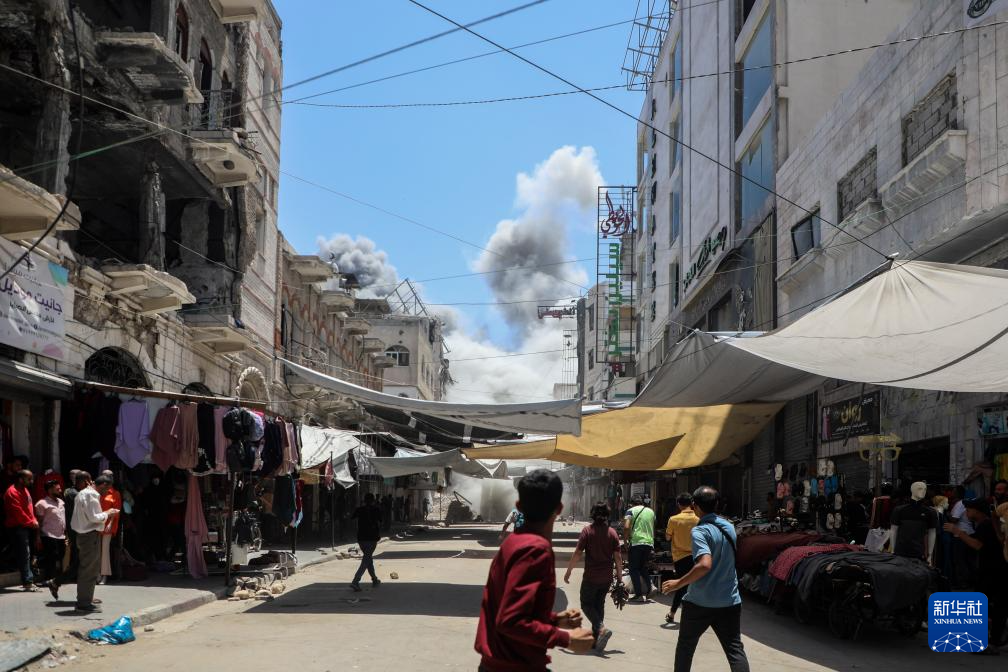
On May 31, smoke rises over Gaza City following a military strike by Israel. (Photo from Xinhua)
A few days ago, the US once again vetoed a draft resolution at the UN Security Council calling for an immediate and permanent ceasefire in Gaza, drawing widespread criticism from other UN Security Council members. On June 5 local time, UN Secretary-General António Guterres expressed his deep disappointment over the outcome. Permanent Representative of China to the UN, Fu Cong, also issued a response, stating that the US has once again abused its veto power, extinguishing the glimmer of hope for the people in Gaza and ruthlessly continuing to leave over two million people in darkness. He added that the US must face the questioning from the international community.
The root cause behind the UN Security Council's inability to bring an end to the hostilities lies in the repeated obstruction of the US. The US has long pursued a policy that strongly favors Israel in the Palestinian-Israeli conflict, placing its own geopolitical interests above international fairness and justice. Since the outbreak of the latest round of the Palestinian-Israeli conflict, the US has provided Israel with extensive military aid and advanced weaponry, effectively offering political and military support for its operations. It has also repeatedly exercised its veto power in the UN Security Council to block resolutions aimed at achieving a ceasefire in Gaza.
Wang Jin, Director of the Israeli Studies Program and Center (ISP&C) at Northwest University, believes that the US veto reflects its intention to shield Israel from further criticism in the draft resolution, while also seeking to maintain its dominant role in handling the Palestinian-Israeli issue. Such actions by the US undermine the authority of the UN Security Council. As the core institution responsible for maintaining international peace and security, the UN Security Council exists to build international consensus and uphold global norms. However, while the majority of countries, guided by humanitarian principles and international law, are urgently calling for a ceasefire in Gaza, the US has once again abused its veto power out of hegemonic considerations, which undoubtedly undermines the very foundation of the international order. This veto will further marginalize the UN Security Council and other UN bodies in addressing the Palestinian-Israeli issue.
The two-state solution is widely recognized by the international community as the only viable path to resolving the Palestinian-Israeli conflict. However, the US has long offered support to Israel's expansion of settlements in the West Bank and erosion of Palestinian territory through such means as arms sales and political protection. With tacit approval from the US, Israel has continued to accelerate settlement expansion, forcing large numbers of Palestinians to flee their homes. This has further fueled tensions and deepened animosity between Palestine and Israel. Under such circumstances, mutual trust has all but collapsed, making meaningful peace negotiations increasingly difficult.
Hegemony cannot bring lasting peace to the Middle East. The turmoil caused by US interference only underscores one truth. The only way to resolve the long-standing conflict between Palestine and Israel is through the establishment of an independent Palestinian state that can coexist peacefully with Israel, with clearly defined borders and mutual guarantees of security and rights. As former Israeli Prime Minister Ehud Olmert recently criticized in Israel's newspaper Haaretz, the government of Israel is currently waging a war without purpose, without goals or clear planning and with no chances of success.
The repeated use of the veto power by the US serves only to fuel the conflict. It cannot bring lasting peace. Only when the international community works together with firm resolve to implement the two-state solution can the flames of war in Gaza be extinguished to offer the Palestinian people a glimpse of peace and truly uphold international fairness and justice.
Editor's Note: Originally published on opinion.haiwainet.cn, this article is translated from Chinese into English and edited by the China Military Online. The information and opinions in this article do not necessarily reflect the views of eng.chinamil.com.cn.













